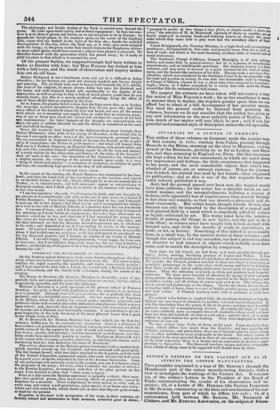SOUVENIRS OF A SUMMER IN GERMANY.
THE author of these volumes on Germany made the regular tout of that country in 1836; starting from Calais, passing through Brussels to the Rhine, steaming up the river to Mayence, visiting several of the Brunnens, pushing on as far as Leipsig and Dres- den, and then returning to England via Paris. On this excursion sho kept a diary for her own amusement, in which she noted down her impressions and feelings, the. little occurrences that happened to her party, and the most remarkable objects that struck her, whether of nature, art, or national customs. When the journey was finished, the journal was read by her friends ; they suggested its publication ; and as this is one of the few requests that are rarely refused, published it was. And. had the ground passed over been new, the request would have been judicious ; for the writer has a cheerful mind, an ani- mated manner, and the accomplishments befitting a woman of fashion, with apparently less of repulsiveness than usually belongs to her class and country, so that she describes pleasantly and al- most vivaciously. But critics know, though friends do not, that interest can only be imparted to the description of a reaped and well-gleaned field by a mind which is singularly gifted by nature or highly cultivated by art. The writer must have the intuitive faculty of putting old things in new lights, and the gift to do it with effect; or science must have taught hitn to look around with learned eyes, and vivify the results of study in agriculture, or trade, or art, or history. Something of this indeed is occasionally done, in a small way, by the amiable writer of these volumes ; and though the subject is not very recondite, see bow a pursuit enables an observer to find interest in objects which nakedly seen have none, and to enrich the description by comparison.
Ever since we left Cassel, we had been, as it were, passing through pic-
tures; living, moving, breathing pictures of Teniurs and Wilkie. It was delightful to look on the realization of what had so often fascinated us on canvas. Nal wonder the Flemish painters excelled in their art—there is something so peculiarly picturesque in the scenes they dwelt among and loved to delineate, that these could nut fail of calling forth every latent spark of genius in their nature. Then the colouring is so rich, so vivid, and produces such beautiful contrasts. We were never wearied of admiring the groups of pots and pans lying outside the farm-houses ; their farms graceful in the higlie,t degree, and in endless variety, and all of them of course quite new to us. The cohans, too, are as varied and picturesque as the shapes. Besides the sienna brown we are so funiliar with at home, there is a sort of bright peculiar green, a pale yellow and lead colour. A Flemish crockery.ware stall is certainly a study fora pal nter. For several miles before we reached Lille, the dwellings that had so Inng de- lighted our eyes began to diminish in number, and soon ceased altogether. It was like descending from the poetry of life to its prose, quitting these beautiful pastoral scenes fur a manufacturing district. In turning the angle of a road, we came suddenly upon a complete forest of windmills—there could nut have been less than two hundred, all close to each other ; and the effect of so many wheels in rapid motion was quite dazzling. They were employed in the ma- nufacture of rape-oil. We met several large flocks of sheep on time road. I was struck by their shape, which differs very much from the English ; and here again rime old Flemish paintings, and particularly those on So iptural subjects, where sheep are so often introduced, recur perpetually to the mind. The whole outline of the animal is far more graceful than in those of our country ; and in the curve of the head eapecially, there is a beauty and an expression of meekness quite peculiar to themselves. The thousand touching images and ideas inseparable from a flock of sheep, seem to be suggested with double force by these.


























 Previous page
Previous page